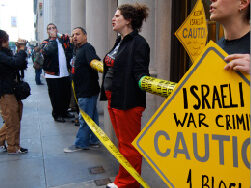

IJAN participatedin amobilization to press the Board of Supervisors (BOS) in SanFrancisco to take a strong stand condemning the attack on theFreedom Flotilla and the blockade of Gaza. On June 8,with about 50 other people, IJANwent to a Board of Supervisors meeting and took part in a powerful speak-out inthe Board chambers.
As a result of the strongstatements made at the meeting, including by participants of the flotilla, anhistoric resolution was introduced by four supervisors, which was abreakthrough. As part of the continuedpressure, IJAN lobbied supervisors with Palestinian and other Jewish groups topress them to back the resolution. Wewere invited to speak at a press conference outside City Hall on June 15insupport of the resolution. We againattended a second BOS meeting on June 15 where many people spoke again againstthe brutal attack on the flotilla and calling for the blockade of Gaza to end.
To read the San Francisco Board of Supervisor's resolution, go to: http://www.sfbos.org/ftp/uploadedfiles/bdsupvrs/bosagendas/materials/bag061510_100767.pdf
IJAN supported Students forJustice in Palestine’seffortsto defend a UC Berkeley student government resolution which called forUC Berkeley to divest from two companies complicit in Israeli war crimes. After the student Senate overwhelminglypassed the measure, they came under tremendous pressure from AIPAC and its ilk.The student body president then vetoed the bill, and a few senators withdrewtheir support.
IJAN’s work. In solidarity with the movement tooverride the veto of this important bill, we activated our phone trees and sentemails, turning out IJAN members to two all-night packed Student Senatemeetings on campus. We also wrote astatement in support of the divestment bill, using our Jewish-rooted voice toadvance the Palestinian narrative in the debate.
Thestatement is available at http://www.ijsn.net/C87/and was also featured on the campaign’s website, http://www.caldivestfromapartheid.com/
Thecampaign. IJAN was proud to standwith SJP and dozens of campus and community organizations. (off-campusgroups listed at http://www.caldivestfromapartheid.com/2010/04/27/statement-of-support-from-off-campus-organizations/.) Archbishop Desmond Tutu and 4 other nobel laureates, along withHolocaust survivor Hedi Epstein, also offered movingsupport for the bill. While in the end, the effort fell just one vote short ofoverturning the veto (with an impressive 13 out of 20 student senators votingto reinstate the divestment bill; 14 out of 20 were needed), there waswidespread agreement that this inspiring campaign – with hundreds of studentsand community members organizing together to support the bill, and significantpublic scrutiny brought upon Israel’s crimes – was a major victory for themovement. Moreover, Israel’sConsulGeneral for the region was present through both all-night hearings; in a sense,the Israeli government was forced to publicly confront its crimes beforehundreds of activists.
Analysisfrom members of SJP is available at http://www.caldivestfromapartheid.com/2010/05/29/bds-at-uc-berkeley-the-campaign-the-vote-and-the-veto-by-youmna-derby-and-dina-omar/

IJAN is one of the core groups in the Bay Area Campaign to End Israeli Apartheid (BACEIA), which was initiated by Break the Siege, a group that emerged out of the 2006 attacks on Lebanon and Gaza. In the last month, BACEIA has identified a target for a long-term campaign. In addition, IJAN Bay Area is supporting smaller efforts to target organizations and festivals that break the boycott. As we develop our local JNF campaign, we will bring it to BACEIA.

CONTACT
FOLLOW US
SUBSCRIBE TO OUR NEWSLETTER
BUSINESS OF BACKLASH
Click here to download the 120-report which exposes the funders of Zionist backlash on campuses and in communities
SEARCH THE SITE
NAVIGATION
WHO WE ARE
NEWS & OPINIONS
PROJECTS & CAMPAIGNS
CHAPTERS & SECTORS
RESOURCES
GET INVOLVED

